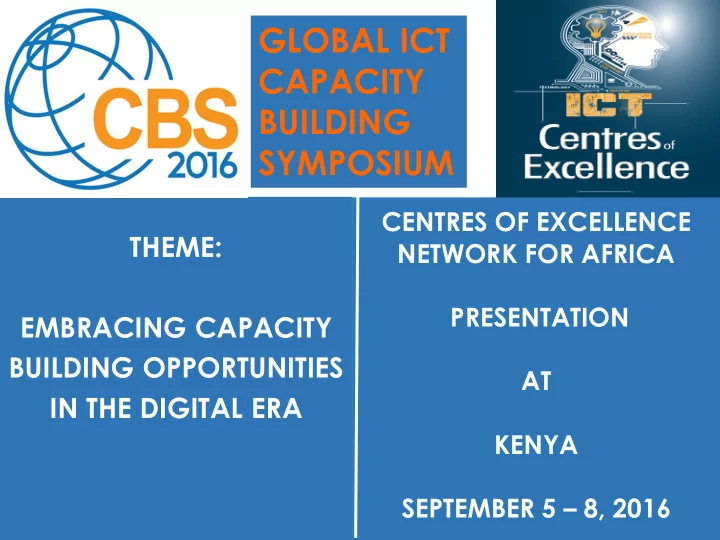

GLOBAL ICT CAPACITY BUILDING SYMPOSIUM CENTRES OF EXCELLENCE THEME: NETWORK FOR AFRICA PRESENTATION EMBRACING CAPACITY BUILDING OPPORTUNITIES AT IN THE DIGITAL ERA KENYA SEPTEMBER 5 – 8, 2016
CoE NETWORK FOR AFRICA Selected in 2014 as part of 32 CoEs in 2015-2018 cycle AFRALTI KENYA ESMT SENEGAL ESATIC COTE D’IVOIRE CENTRE FOR LEARNING, TELKOM SA URCST RWANDA DIGITAL BRIDGE INSTITUTE (DBI)
DBI-NCC Relationship DBI was registered by NCC as a not-for-profit training institute in 2004 with mandate for ICT capacity building. NCC funds major CAPEX of DBI while the Institute is responsible for operating spending NCC provides intervention funds for ICT capacity building - ADAPTI, DAP etc.
DBI – NCC Relationship DBI operates as a subsidiary with its own Board and operating structure NCC is represented on the Board of DBI by the EVC and the Commission’s Chairman NCC appoints the CEO of DBI NCC sponsors staff to DBI courses on a fee- paying basis
NCC-Supports DBI as CoE NCC sponsors DBI staff to CoEs Meetings and Events NCC supports DBI to sustain membership of ITU CoE Network NCC playing major role in DBI’s hosting of the upcoming ITU CoE Network for Africa meeting in Nigeria holding November this year
ADAPTI: Flagship of ICT Capacity Building In 2006 DBI designed the Advanced Digital Appreciation Programme for Tertiary Institutions (ADAPTI) Programme approved for funding by the Commission’s Board and was launched on September 11, 2006 – ten year anniversary of the programme to be marked next week. From inception to date over 32,000 teaching and non- teaching staff from over 100 tertiary institutions have been trained.
ADAPTI Implementation Process ADAPTI curriculum designed to provide basic level skills on office productivity tools. Expression of interest is requested by DBI directly and through the NUC, NBTE and NCCE Interested tertiary institutions submit list of nominated staff to DBI for screening.
ADAPTI Implementation Process Approved institutions must confirm availability of training facility including Internet availability NCC staff coordinates training jointly with DBI staff. End of training report required from coordinators to include feedback from participants and institution
ADAPTI Funding Framework NCC makes budgetary provision for ADAPTI yearly through parliamentary appropriation based on proposal from the DBI Implementation commences following budgetary approval Payments are made by the NCC to DBI at the end of every scheduled ADAPTI training.
Benefits of NCC-DBI Relationship NCC’s funding of DBI capital expenditures provides significant strategic infrastructure while relieving DBI of the financial burden. NCC discharges some of its CSR responsibilities through DBI NCC’s patronage of DBI programmes is a core element of institute’s sustainability
Challenges Low patronage of professional courses Low public awareness of DBI courses and activities Federal Government policies regarding bidding processes for training projects
Remediating Measures Increased intervention funding and patronage by the NCC Incorporation of DBI business entity as a response to exclusion from Government bidding process. Increased partnerships and collaborations (e.g DBI-ITU, DBI-CTO, DBI-AFRALTI, Cisco, Microsoft, other Government Agencies etc)
Remediating Measures Policy initiative at ITU level to establish a Global Training Fund or to earmark a portion of USPF for universal access to digital skills initiatives and projects for ITU Centres of Excellence.
Remediating Measures By analogy to the objective of the USPF, the fund should be defined for use to provide ‘ universal access to digital skills ’ to the Rural, Un-Skilled and Under-Skilled citizens. Enhanced operational Budget by member countries to the CoEs.
DBI PARTNERS & Others
THANK YOU Ikechukwu Adinde, PhD Administrator - DBI
Recommend
More recommend